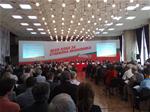The BSP promises to increase the forests in the country
Adelina Marini, June 12, 2009
 Against the background of the fights against the forest exchanges, state property, for the last 4 years during which the BSP (the Bulgarian Socialist Party) put a record even ahead of their partners from the DPS (the Movement for rights and freedoms, perceived as the party of the Turkish minority in Bulgaria), of the largest number of forest exchanges, now the governance programme uncovers another image of the 100-year party - of a concerned for the forests party. And not someone else, but the director of the State Agency for the Forests, himself, Stefan Yurukov explained that 3 are the main priorities of the BSP in the field of forests: increase of the forest coverage of the country, protection of the bio-diversity in the forest eco-systems and economic stabilization of the forest sector. By the way it was the BSP that fought silent wars with its coalition partners to separate the State Forest Agency from the Ministry of Agriculture, ruled by the DPS.
Against the background of the fights against the forest exchanges, state property, for the last 4 years during which the BSP (the Bulgarian Socialist Party) put a record even ahead of their partners from the DPS (the Movement for rights and freedoms, perceived as the party of the Turkish minority in Bulgaria), of the largest number of forest exchanges, now the governance programme uncovers another image of the 100-year party - of a concerned for the forests party. And not someone else, but the director of the State Agency for the Forests, himself, Stefan Yurukov explained that 3 are the main priorities of the BSP in the field of forests: increase of the forest coverage of the country, protection of the bio-diversity in the forest eco-systems and economic stabilization of the forest sector. By the way it was the BSP that fought silent wars with its coalition partners to separate the State Forest Agency from the Ministry of Agriculture, ruled by the DPS.
Very impressive is the fact that the forest are in a separate governance project in the governance programme of the socialists. It also foresees the implementation of a market-oriented approach and public-private partnership for the development of the forests and the keeping of the game. But the document does not make it clear whether the forest exchanges will continue or by the above some kind of privatisation is meant.
And with regard the most criticised field in the European Commission's reports and by the  Bulgarian citizens as well - justice and home affairs, the BSP plans "gradual guaranteeing of zero tolerance toward crime, including the mass crime", interesting but unclear. Another interesting and still unclear intention of the socialists is "organising of the system for fight with the crimes with high level of social danger, exercising psychological pressure over citizens and the society and undermining the trust in the law enforcement bodies". The legislation framework of the State Agency "National Security" (SANS) and the Ministry of the Interior will be perfected so that the reforms in these institutions are to be guaranteed. But there's no mention whether these reforms include some real end of the attempts of the current tripartite coalition to impose some kind of control over SANS.
Bulgarian citizens as well - justice and home affairs, the BSP plans "gradual guaranteeing of zero tolerance toward crime, including the mass crime", interesting but unclear. Another interesting and still unclear intention of the socialists is "organising of the system for fight with the crimes with high level of social danger, exercising psychological pressure over citizens and the society and undermining the trust in the law enforcement bodies". The legislation framework of the State Agency "National Security" (SANS) and the Ministry of the Interior will be perfected so that the reforms in these institutions are to be guaranteed. But there's no mention whether these reforms include some real end of the attempts of the current tripartite coalition to impose some kind of control over SANS.
A large number of the intentions of the BSP in their governance project "Justice and home affairs" are, unfortunately, formulated mainly as slogans but what we can derive as something more specific is the creation of a Legislation Council with the main task to improve the quality of the legislation process (where's the parliament?). Beside this a unified penal policy will also be developed. The socialists promise to develop the model "Police near society". Penal and economic repression, depriving criminals from the opportunity to use their financial means, earned from criminal activity, is another measure in the fight against organised crime.
Despite the crisis the BSP promise a policy of the enhanced increase of incomes to continue in such way that the average salary to become 900-950 lv (462-487 euro). The current Minister of labour and social affairs Emilia Maslarova explained that she has very carefully studied the election programmes of the opposition and considers them unrealistic. She focused on the intention of the opposition to increase the additional payment of 20 lv for a widow pensioner to 40 lv, by saying that to realise this some 350 mn lv would be necessary and this means the other pensioners to suffer. But in the programme of the BSP it is written that the average pension will become 400-450 lv. (205-231 euro). But it doesn't say where the money for this would come from.
In the very beginning of the presentation of the governance priorities of the BSP, the prime minister and leader of the party Sergey Stanishev expressed his disappointment from the way the media have reported the achievements of his government. This is an interesting remark against the background of fundamental shifts in the media landscape in Bulgaria during his rule. Maybe it would be good if the prime minister finally realises that the media cannot be blamed if something went not the way he wanted. He had 4 years to prove he can. And the media that would try and hide the good things are not that many. Like, for example, no one is denying the introduction of the flat tax of 10%. But everything else deserves serious and thorough criticism. And the prime minister instead of wondering is there a difference between media and PR agencies, he better derive some conclusions from his 4-year term, please!